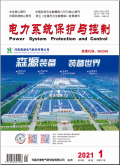电力系统保护与控制2024,Vol.52Issue(19):85-96,12.DOI:10.19783/j.cnki.pspc.231546
基于改进MMD-GAN的可再生能源随机场景生成
Stochastic scenario generation for renewable energy based on improved MMD-GAN
摘要
Abstract
It is difficult to obtain an accurate characterization of the uncertainty of renewable energy output.Thus an approach for generating stochastic scenarios of renewable energy based on improved maximum mean discrepancy generative adversarial networks(MMD-GAN)is proposed.First,the fundamental principles of GAN and MMD-GAN are described,and an improved scheme of MMD-GAN is proposed,one which enhances the discriminator's loss function on the basis of MMD-GAN and uses spectral normalization and the bounded Gaussian kernel to improve the training stability of the generator and discriminator.Then,the process of stochastic scenario generation for renewable energy based on the improved MMD-GAN is designed.Finally,the effects of the proposed methods are analyzed.The performance of improved MMD-GAN,MMD-GAN,and typical GAN are compared.The results indicate that the improved MMD-GAN method can reduce the Wasserstein distance between the generated distribution and the real distribution by more than 50%contrasted with the comparison method,and the generated scenario accuracy can be effectively improved.关键词
场景生成/最大均值差异/生成对抗网络/可再生能源/数据驱动Key words
scenario generation/maximum mean discrepancy(MMD)/generative adversarial networks(GAN)/renewable energy/data-driven引用本文复制引用
吴艳梅,陈红坤,陈磊,褚昱麟,高鹏,吴海涛..基于改进MMD-GAN的可再生能源随机场景生成[J].电力系统保护与控制,2024,52(19):85-96,12.基金项目
This work is supported by the Joint Fund of National Natural Science Foundation of China(No.U23B20117). 国家自然科学基金联合基金项目资助(U23B20117) (No.U23B20117)

